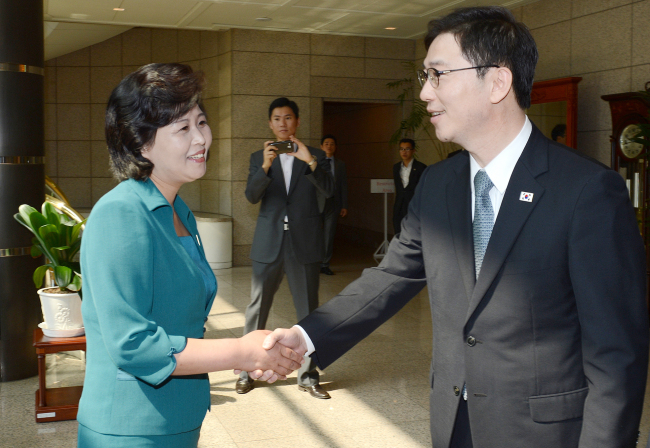
South and North Korea came to an agreement Monday to hold an official government meeting between "responsible authorities" in Seoul later this week with the aim of resolving pressing inter-Korean issues that can help build mutual trust and ease uncertainties on the Korean Peninsula.
The Ministry of Unification said in a statement released after a marathon negotiation lasting 17 hours that the two sides reached a partial understanding on outstanding issues at the working-level talks carried out at the truce village of Panmunjom.
The understanding reached opens the way for formal talks to be held between government authorities of both countries for the first time in several years.
The statement said Seoul and Pyongyang agreed to hold talks for two days starting on Wednesday, and that the official title of the gathering has been changed to the South and North Korean governments meeting. Originally the South called for a ministerial meeting.
The two sides concurred on the North Korean delegation arriving in the South by land, and that additional details of the planned talks are to be discussed through the liaison channels that run through Panmunjom.
Despite the long, drawn-out talks, the two sides failed to see eye-to-eye on what agendas should be fixed in the upcoming discussions and who will lead the delegations for the two sides.
"The two sides reached a compromise that allows Seoul and Pyongyang to release two separate statements reflecting their respective views on what should be discussed as agendas in the two-day talks and who should lead the respectively delegations," a ministry official said.
He said South Korea's position called for pressing matters such as the Kaesong Industrial Complex, Mount Kumgang tours and reunions for families separated by the Korean War (1950-53), while the North emphasized the need to arrange joint celebrations involving non-government groups. The communist country had called for the joint hosting of celebratory events to mark the 13th anniversary of the June 15 South-North Joint Declaration and the 1972 July 4th North-South Joint Statement.
Seoul has banned its citizens from going to the North to take part in the June 15 event since 2008. It sees the event as a ploy by the North to fuel internal discord in the South.
The North also said that it will send a "senior official" as the chief delegate, while Seoul wanted a person who has the authority and stature to touch on and resolve outstanding issues.
South Korea said it will send Unification Minister Ryoo Kihl-jae and wanted Kim Yang-gon, the head of the North's United Front Department of the ruling Workers' Party of Korea, at the talks. Kim is viewed as being the top official in Pyongyang for South Korean affairs.
Related to the talks, an official at the ministry who did not wished to be identified said that Seoul's insistence on Kim attending as chief delegate and inclusion of the June 15 celebration in the formal statement delayed the conclusion of talks.
"In the end the two sides opted to get over their differences by skirting the difficult issues," he said, admitting that the issues could be a problem when the meeting does take place. He declined to say if Seoul will bring up denuclearization at the future talks.
There has been speculation that Seoul will ask for assurances from the North that would make it difficult for the communist country to unilaterally close the Kaesong complex and to win an apology for the shooting death of a tourist in 2008 that stopped the Mount Kumgang tours. Operation at Kaesong came to a stop after the North pulled all of its laborers from the complex on April 9.
The working-level meeting came after the North's Committee for the Peaceful Reunification of Korea (CPRK) called for working-level talks Friday following its earlier proposal to hold government-level talks to resolve various inter-Korean issues.
Seoul accepted the government-to-government talks and countered by asking for a ministerial-level meeting so all key issues could be discussed by responsible officials.
Chun Hae-sung, head of the unification ministry's policy bureau, led the three-person South Korean delegation at the truce village. Leading the talks for the North was Kim Song-hye, an official at the CPRK with extensive experience in dealing with the South. She is one of the few female officials at the CPRK with experience in handling inter-Korean talks.
Related to the talks, the presidential office of Cheong Wa Dae said it carefully monitored the developments at Panmunjom.
The Cheong Wa Dae added that President Park is expected to chair a meeting of security and foreign affairs ministers later in the day to reflect ongoing efforts by Seoul and Pyongyang to resolve outstanding issues through dialogue and review the recent summit meeting between U.S. President Barack Obama and Chinese leader Xi Jinping. The two leaders confirmed that they will not accept North Korea as a nuclear power, despite insistence by Pyongyang that it will never give up is nuclear capability.
The communist country detonated its third nuclear device on Feb. 12 and claimed it has successfully miniaturized its nuclear arsenal.
Political observers in Seoul, meanwhile, speculate that if ministerial talks do take place and progress is made, North Korean representatives may be able to meet the South Korean president.
"There is precedence for such a meeting taking place, that could allow North Korea to convey the wishes of their leader Kim Jong-un to the South Korean chief executive," an expert said. This, he claimed, would be a sort of "indirect summit" that could lay the foundation for trust building down the road. (Yonhap News)

















![[KH Explains] Hyundai's full hybrid edge to pay off amid slow transition to pure EVs](http://res.heraldm.com/phpwas/restmb_idxmake.php?idx=652&simg=/content/image/2024/04/18/20240418050645_0.jpg&u=20240418181020)

![[Today’s K-pop] Zico drops snippet of collaboration with Jennie](http://res.heraldm.com/phpwas/restmb_idxmake.php?idx=642&simg=/content/image/2024/04/18/20240418050702_0.jpg&u=)